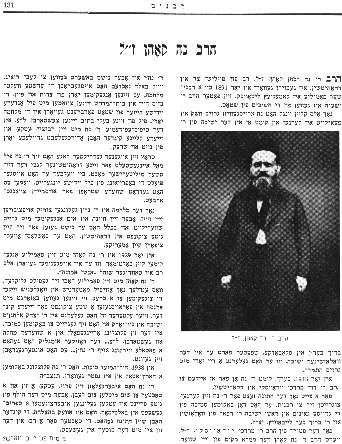
[ Page 131 ]
[
Page 132
]
RABBI ASHER EISENSTEIN
[Photo:] Rabbi Asher Eisenstein
Rabbi Asher Eisenstein was born in Drohitchin; his parents were R. Berl and
Toiva. In Drohitchin, R. Asher was known as “Asher Toiva's” even
though he rarely visited Drohitchin.
I first met R. Asher in
approximately 1923, when I went to study at the Grodno yeshiva. At that time
Rabbi Eisenstein was the head of the elementary school division of the yeshiva,
and it goes without saying that Rabbi Eisenstein was extremely kind to me, and
I frequently visited him at his home.
R. Asher was educated in the
large yeshivas of Slobodka, Volozhin and others, and was ordained into the
rabbinate by the great scholars and heads of yeshiva, Rabbi Isser Zalman
Meltzer and Rabbi Baruch Ber Leibovitz. In the yeshivas, R. Asher was known as
“R. Asher Drohitchiner,” and was greatly respected. He was considered
a great scholar and a man of great character. It is said that Rabbi Chaim
Soloveitchik greatly admired R. Asher, who became very close to Rabbi
Soloveitchik. He was especially distinguished at the Grodno yeshiva, and held
in high esteem by Rabbi Shimon Shkop.
R. Asher was very creative in
his Talmudic studies, and had written many of his own Torah commentaries,
though I don't know if he ever published any of his manuscripts. Rabbi
Eisenstein's wife was an attractive and educated woman; she was the daughter of
the rabbi of Yashinovka (near Byalistock). Although they had no children, their
life together was idyllic and satisfying.
In approximately 1926 Rabbi
Eisenstein was selected as the rabbi of Semiatitsch, near Byalistock. A yeshiva
student (Chaimovich) and I were selected by the yeshiva administration to
accompany R. Asher to Semiatitsch, where R. Asher was welcomed with great
respect and affection. Over the years, I lost contact with Rabbi Eisenstein,
and never heard from him again. I have heard that he and his wife shared the
same fate as the other Jewish martyrs in Poland. Rabbi Eisenstein had a
brother, Shimon, a full-time yeshiva student, and one sister. They were all
killed, except for two sisters who were in Palestine.
RABBI ELIYAHU V. ALTWARG
[photo:] Rabbi Eliyahu Velvel Altwarg
Rabbi Eliyahu Velvel Altwarg was born in Drohitchin. His father, R. Chaim Ber
the glassmaker, was a respected businessman from the Street House of Study, and
served as the teacher of the Mishnah study group. Nothing is known about R.
Velvel's youth; all that is known is that studied at the Slobodka yeshiva. He
married the daughter of a rabbi in Lithuania, and for a few years before World
War I, he was the rabbi of Vidz, a town in Lithuania.
When World War I broke out, R.
Eliyahu Velvel and his family went to Drohitchin, where he remained thereafter,
and served unofficially as the rabbi of the Street House of Study. He would
give speeches on the holydays and on various other occasions.
Later, when the rabbi of the
“Polish side,” rabbi Noach Kohn, left for the United States, some
Jews from the “Polish side” started buying yeast from Rabbi Altwarg,
which stirred opposition from the supporters of the official rabbi, Rabbi
Kalenkovitch, who had previously purchased the rights to sell yeast from Rabbi
Kohn. These supporters brought the rabbi of Pinsk, Rabbi Aharon Walkin, to
Drohitchin to resolve the controversy. Unfortunately, no resolution was
attainable, and R. Eliyahu continued selling yeast. His wife helped him in this
business, and was a virtuous woman and community leader.
R. Eliyahu Velvel had three
sons and one daughter.
JewishGen, Inc. makes no representations regarding the accuracy of
the translation. The reader may wish to refer to the original material
for verification.
JewishGen is not responsible for inaccuracies or omissions in the original work and cannot rewrite or edit the text to correct inaccuracies and/or omissions.
Our mission is to produce a translation of the original work and we cannot verify the accuracy of statements or alter facts cited.
 Drogichin, Belarus
Drogichin, Belarus
 Yizkor Book Project
Yizkor Book Project
 JewishGen Home Page
JewishGen Home Page
Copyright © 1999-2025 by JewishGen, Inc.
Updated 13 Dec 2001 by LA